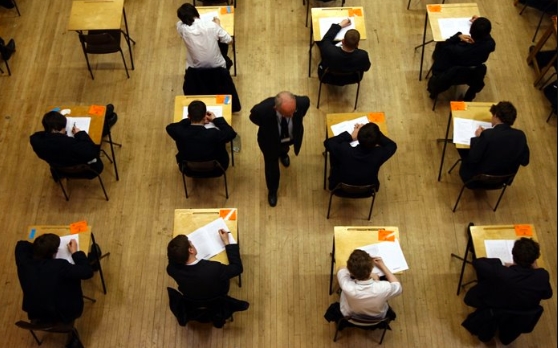Scotland’s education system has suffered a huge decline in its performance in the latest Pisa rankings, an international survey that measures the skills of 15-year-olds in reading, maths and science. The country’s scores in all three subjects were lower than the OECD average, and well below the levels achieved in 2000.
Pisa: What is it and why does it matter?
Pisa stands for Programme for International Student Assessment, and it is conducted every three years by the Organisation for Economic Co-operation and Development (OECD). It tests the abilities of 600,000 students from 79 countries and regions to apply what they have learned in school to real-life situations. The results are used to compare the quality and equity of education systems across the world, and to identify best practices and areas for improvement.
Pisa is not the only way to measure educational outcomes, and it has been criticised for its methodology, validity and impact. Some argue that it is too narrow, too focused on standardised tests, and too influenced by cultural and economic factors. Others claim that it creates pressure and competition among countries, schools and students, and undermines the diversity and creativity of education.
However, Pisa is widely regarded as a reliable and influential source of information on education, and it can have a significant effect on policy decisions and public perceptions. For example, after the 2016 Pisa results showed that Scotland had fallen to the OECD average in all three subjects, the Scottish government announced a series of reforms to improve the curriculum, assessment and governance of education.
Scotland’s performance in 2023: A mixed picture
The 2023 Pisa results, which were based on tests taken in 2022, showed that Scotland had improved slightly in reading, but declined further in maths and science. Compared to the other UK nations, Scotland was ahead of Wales and Northern Ireland, but behind England in all three subjects.

Scotland’s score in reading rose from 493 in 2016 to 504 in 2023, which was above the OECD average of 487, and ranked 18th out of 79 countries and regions. This was the only subject where Scotland performed better than in 2000, when it scored 502.
Scotland’s score in maths dropped from 491 in 2016 to 489 in 2023, which was below the OECD average of 495, and ranked 29th out of 79 countries and regions. This was the lowest score that Scotland had ever achieved in maths, and far below the 533 that it scored in 2000.
Scotland’s score in science fell from 497 in 2016 to 490 in 2023, which was also below the OECD average of 503, and ranked 28th out of 79 countries and regions. This was the second lowest score that Scotland had ever achieved in science, and much lower than the 522 that it scored in 2000.
The reasons behind the decline: A complex and contested issue
The reasons behind Scotland’s decline in Pisa rankings are not clear-cut, and there are different views and interpretations among experts, policymakers and stakeholders. Some of the possible factors that have been suggested include:
- The impact of the Curriculum for Excellence, a major reform that was introduced in 2010 to provide a more flexible and holistic approach to learning and teaching. Some argue that the reform has been poorly implemented, lacks clarity and coherence, and has led to a loss of focus and rigour in core subjects. Others defend the reform as a progressive and innovative vision that needs more time and support to realise its full potential.
- The effect of poverty and inequality, which are known to have a negative influence on educational attainment and achievement. Scotland has a high level of child poverty, which has increased in recent years due to austerity measures and welfare cuts. The gap between the most and least deprived students in Scotland is wider than the OECD average, and has not narrowed significantly since 2000.
- The quality and quantity of teachers, who are the key to delivering effective and engaging learning experiences. Scotland has faced a shortage of teachers, especially in maths and science, and has struggled to recruit and retain qualified and motivated staff. The workload and morale of teachers have also been affected by issues such as bureaucracy, assessment, accountability and pay.
- The role of assessment and evaluation, which are essential for monitoring and improving the performance of students, teachers and schools. Scotland has a complex and controversial system of assessment and evaluation, which has been criticised for being inconsistent, unreliable and burdensome. The Scottish government has abolished national tests for primary students, and reduced the number of exams for secondary students, but has also introduced new standardised assessments and inspections.
The reactions and responses: A call for action and improvement
The 2023 Pisa results have sparked a range of reactions and responses from different actors and groups in the Scottish education system. Some of the main ones are:
- The Scottish government, which has welcomed the improvement in reading, but acknowledged the challenges in maths and science. It has also emphasised the positive aspects of the Scottish education system, such as the high levels of participation, attainment and satisfaction among students. It has pledged to continue its reforms and investments to raise standards and close the attainment gap.
- The opposition parties, which have blamed the Scottish government for the decline in Pisa rankings, and accused it of failing to deliver on its promises and priorities. They have also called for more resources, support and autonomy for teachers and schools, and more accountability and transparency for the government and its agencies.
- The teachers’ unions, which have expressed their disappointment and frustration with the Pisa results, and highlighted the challenges and pressures that teachers face. They have also demanded more recognition, respect and reward for their work, and more involvement and consultation in the development and implementation of policies and reforms.
- The parents’ associations, which have expressed their concern and dissatisfaction with the Pisa results, and urged the government and the education authorities to take action and improvement. They have also asked for more information, guidance and involvement in their children’s learning and progress, and more choice and diversity in the education system.
- The students’ organisations, which have expressed their views and opinions on the Pisa results, and shared their experiences and aspirations in education. They have also advocated for more voice, participation and empowerment in their learning and development, and more opportunities and support for their future.


















